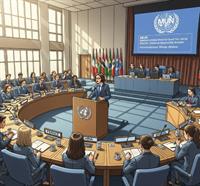_600.jpeg)
Tips to Write an Amazing Model United Nations Position Paper
At most Model United Nations conferences, delegates are required to submit a position paper, which is an essay covering a country's perspective on the themes that have been allocated for the conference. If you take the time for writing a MUN position paper a position paper, you will not only be able to improve your knowledge of your country and the complexities of its foreign policy, but you will also put yourself in a better position to win prizes, whether those awards are for the best position paper or for becoming the best delegate as a result of your increased knowledge.
When writing a MUN position paper, there are five aspects about your country that you need to know:
There are five basic components that make up an effective position paper, and they are as follows:
1. Starting Point
Although the heading is not the most significant section of a position paper, it does give the chair an overview of the topics that will be discussed in the rest of the work.
Even if the requirements for what should be included in the heading are varied for each conference, the general guideline is that you need to mention your country's name, as well as the committee, the topic, and the delegate's name.
It is best to stand out by not sticking out and to make sure that your paper looks as normal as it possibly can. In the end, the first impression that you will create on the Chair will be based on your format, therefore it is best to do so.
2. The Introduction and Context of the Subject
Your position paper, like any other kind of paper, requires a strong introduction. The chairs at Model United Nations will have to read a large number of position papers, so beginning with a strong hook will encourage them to read the entire article rather than skimming it. It goes without saying that beginning with a quote, a question, or a "interesting" fact is all very cliche; therefore, the most effective technique to captivate your reader is to begin by discussing the background of the topic.
In order to produce a solid background section on the topic, you will first need to present some information on the issue, and then you will move on to analyse the topic.
3. Analyse Past Decisions
The section of your position paper that discusses historical measures taken by the United Nations has the potential to either make your paper stand out and win points with the committee or be relegated to the background.
In this section, you will be tasked with accomplishing two goals: first, you will examine previous solutions, such as action plans put into place by the United Nations and other international organisations, as well as resolutions submitted by the General Assembly and the Security Council; second, you will evaluate these solutions and determine where they fell short.
By reviewing specific acts and looking at their successes and failures, you demonstrate to the chair that you are dealing with diverse ideas. This might help you create specific actions that you can take because it demonstrates that you are engaging with a variety of concepts.
In addition, by examining at resolutions that have been offered, whether or not they have been successful in passing, it is possible to examine what is currently in effect and what went wrong, as well as what could have been in effect, who opposed it, and what reasons they had for opposing it. Your Chair will have something to read that is more fascinating than a list and explanation of the same treaties if you analyse the activities, and this will make it simpler for you to come up with remedies that are likely to be effective.
4. State of the Nation Address
When examining the policy of a country, it is important to look at both the international action (resolutions voted for or against, programmes sponsored or been involved with) and the domestic action (legislation and policies within the country) of that country.
When writing a MUN position paper, you should also look at trends to determine what your country favours or does not favour generally and grasp the basic aims of your country, whether those goals involve a focus on Islamist ideals, sovereignty, or human rights.
5. Suggested Approaches to the Problem.
Your position paper's solutions are by far the most important phase, and this section of the document should be the most densely packed in terms of quality. You can start to build an arsenal of solutions that can withstand scrutiny by using the sub issues that you addressed in the topic background section, the history of what has and has not worked in the past UN action section, as well as your general philosophy and specific domestic actions from your country policy.
In the final sentence of your solutions paragraph, you should provide a concise summary of the solutions that you have proposed and reiterate the reasons why they are effective in resolving the problem.
Related Blogs
-

19-Jan-2026 How to Prepare for Your First MUN?
-

24-Dec-2025 Top Nearby MUN Conferences for Students to Join
-

27-Nov-2025 Global Voices Assemble India Next Big MUN Conference
-

13-Nov-2025 From Ideas to Impact Join the MUN India Workshop
-

14-Aug-2025 What Is A Conference In MUN?
-

07-Aug-2025 What Does the MUN Do?
-

03-Jul-2025 Ways to Research for a Model UN Position Paper
-

28-Mar-2025 What skills do you gain from Model United Nations?
